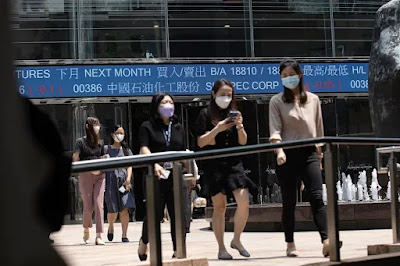HONG KONG –– Asian equities rose and the dollar weakened Tuesday as China avoided another night of protests after a weekend of unrest across the country fueled uncertainty in the world's number two economy.
The gains were led by a rally in Hong Kong and Shanghai, with property firms enjoying a much-needed surge on the back of moves to ease funding restrictions on troubled developers.
However, the sentiment was tempered by warnings from top Federal Reserve policymakers that US interest rates would rise further and could go higher than initially thought to fight inflation.
The remarks were partly to blame for big losses of more than 1 percent in Wall Street's 3 main indexes.
China was rocked by demonstrations at the weekend calling for more political freedoms and an end to the country's long-running and economically painful zero-COVID strategy that has seen millions thrown into lockdown for months.
Several arrests were made and security forces were out in force Monday to prevent a repeat of the protests, which were the most widespread since pro-democracy demonstrations were crushed in 1989.
The return of some calm helped Hong Kong stocks rally more than 3 percent and Shanghai more than 1 percent, with some commentators suggesting the unrest could actually help push leaders to ease some of the strict containment measures.
Property firms were among the best performers after China said it would end a ban on firms raising cash by selling stocks, marking the latest measure to ease pressure on the sector, which has seen several companies collapse and threatens the wider economy.
Sydney, Seoul, Singapore, Wellington, Taipei and Jakarta were also in positive territory, though Tokyo dipped with Manila.
Attention is turning to the United States this week with a number of Fed officials due to speak, including boss Jerome Powell, while Friday sees the release of key jobs data, which could provide an idea about the bank's plans for monetary policy.
Bets on a slowdown in its pace of rate hikes have boosted markets for the past weeks, but some high-ranking members on Monday looked to play down the chances of a more dovish pivot.
St. Louis Fed chief James Bullard warned "markets are underpricing a little bit the risk that the (policy board) will have to be more aggressive rather than less aggressive in order to contain the very substantial inflation that we have in the US".
And Richmond Fed president Thomas Barkin added: "I'm very supportive of a path that is slower, probably longer and potentially higher than where we were before."
The officials indicated borrowing costs would not likely come down until the end of next year or in 2024.
Key figures around 10:30 a.m. in Manila
Tokyo - Nikkei 225: DOWN 0.6 percent at 27,999.82 (break)
Hong Kong - Hang Seng Index: UP 3.6 percent at 17,920.01
Shanghai - Composite: UP 1.6 percent at 3,128.24
Euro/dollar: UP at $1.0357 from $1.0347 on Monday
Dollar/yen: DOWN at 138.85 yen from 138.87 yen
Pound/dollar: UP at $1.1992 from $1.1952
Euro/pound: DOWN at 86.40 pence from 86.50 pence
West Texas Intermediate: FLAT at $77.24 per barrel
Brent North Sea crude: UP 0.2 percent at $83.34 per barrel
New York - Dow: DOWN 1.5 percent at 33,849.46 (close)
London - FTSE 100: DOWN 0.2 percent at 7,474.02 (close)
Agence France-Presse

